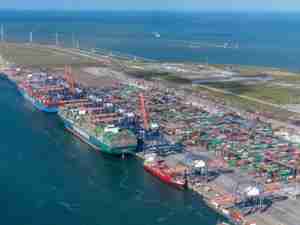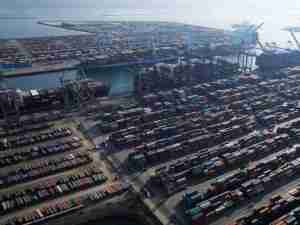RUSCON opens a veterinary control station at Novorossiysk as economic sanctions change Russian impor
posted by AJOT | Mar 16 2015 at 08:04 AM | Ports & Terminals
The economic sanctions imposed on Russia by the EU and the US have prompted RUSCON, one of the leading container specialists in the country, to open the first bonded veterinary control reefer facility at its off-dock terminal in Novorossiysk, South Russia.
The facility, with new veterinary control certifications issued by Rosselkhoznadzor (Veterinary Inspection), is located in RUSCON’s terminal just 7km from the port of Novorossiysk on the Black Sea and is fully equipped for the handling and storage of reefer goods both in containers and on pallets.
Novorossiysk is the main gateway for imports of perishable goods from South-East Asia, the Mediterranean and South America via South Russia. Volumes of meat and seafood/fish from these areas have been increasing since August 2014 when sanctions were imposed on the import of food products from the European Union, the United States and some other countries.
Demand for the import of perishables via Novorossiysk is growing, so RUSCON has upgraded its facility to handle both veterinary and bonded frozen and chilled cargo, offering a competitive solution for temporary storage and customs clearance of reefer goods outside the port. In the past, this service was offered only within the port and at a much higher cost.
“Our veterinary control facility is the only place in South Russia where containers with bonded frozen cargo can be taken out of the port,” says Alexander Shopin, Head of RUSCON's Reefer and Customs branch RUSCON-Broker. “We offer monitoring, EDI reporting, high security and the full scope of operations including customs and veterinary inspections,sampling and restuffing from reefer containers to road vehicles.”
RUSCON provides the complete, secure cold chain service for reefer shippers and consignees in Russia. Cargo is delivered in reefer containers to destinations in South Russia (up to 500-600 km), restuffed into reefer vans for destinations in the centre of the country (up to 1,500 km) and, occasionally, loaded into reefer wagons to customers in the Urals and Siberia.
“We have seen a significant increase in reefer volumes since the sanctions were imposed, so we have expanded our services to meet customer demand,” says Mr Shopin. Imports from the US and Australia were usually routed through the Port of St Petersburg, and those from the EU came via land-borders.
With nine offices throughout Russia, RUSCON handles over 200,000 TEU a year and also offers freight forwarding, storage, terminal handling and bonded trucking. It is part of the Global Container Service (GCS) group.










